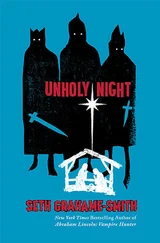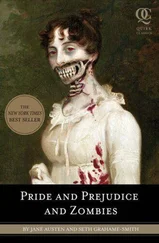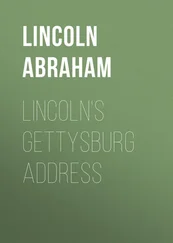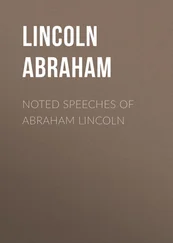I
The boy had been crouched so long that his legs had fallen asleep beneath him—but he dared not move now. For here, in a small clearing in the frostbitten forest, were the creatures he had waited so long to see. The creatures he’d been sent to kill. He bit down on his lip to keep his teeth from chattering, and aimed his father’s flintlock rifle exactly as he’d been taught. The body , he remembered. The body, not the neck . Quietly, carefully he pulled the hammer back and pointed the barrel at his target, a large male who’d fallen behind the others. Decades later, the boy would recall what happened next.
I hesitated. Not out of a conflict of conscience, but for the fear that my rifle had gotten too wet, and thus wouldn’t fire. However, this fear proved unfounded, for when I pulled the trigger, the stock hit my shoulder with such force as to knock me clean onto my back.
Turkeys scattered in every direction as Abraham Lincoln, seven years old, picked himself off the snow-covered ground. Rising to his feet, he brought his fingers to the strange warmth he felt on his chin. “I’d bitten my lip clean through,” he wrote. “But I hardly gave a holler. I was desperate to know if I had hit the poor devil or not.”
He had. The large male flapped its wings wildly, pushing itself through the snow in small circles. Abe watched from a distance, “afraid it might somehow rise up and tear me to pieces.” The flapping of wings; the dragging of feathers through snow. These were the only sounds in the world. They were joined by the crunching beneath Abe’s feet as he found his nerve and approached. The wings beat less forcefully now.
It was dying.
He had shot it clean through the neck. The head hung at an unnatural angle—dragged across the ground as the bird continued to thrash. The body, not the neck . With every beat of its heart, blood poured from the wound and onto the snow, where it mixed with the dark droplets from Abe’s bleeding lip and the tears that had already begun to fall down his face.
It gasped for breath, but could draw none, and its eyes wore a kind of fear I had never seen. I stood over the miserable bird for what seemed a twelvemonth, pleading with God to make its wings fall silent. Begging His forgiveness for so injuring a creature that had shown me no malice; presented no threat to my person or prosperity. Finally it was still, and, plucking up my courage, I dragged it through a mile of forest and laid it at my mother’s feet—my head hung low so as to hide my tears.
Abraham Lincoln would never take another life. And yet he would become one of the greatest killers of the nineteenth century.
The grieving boy didn’t sleep a wink that night. “I could think only of the injustice I had done another living thing, and the fear I had seen in its eyes as the promise of life slipped away.” Abe refused to eat any part of his kill, and lived on little more than bread as his mother, father, and older sister picked the carcass clean over the next two weeks. There is no record of their reaction to this hunger strike, but it must have been seen as eccentric. After all, to willingly go without food, as a matter of principle, was a remarkable choice for anyone in those days—particularly a boy who had been born and raised on America’s frontier.
But then, Abe Lincoln had always been different.
America was still in its infancy when the future president was born on February 12th, 1809—a mere thirty-three years after the signing of the Declaration of Independence. Many of the giants of the American Revolution—Robert Treat Paine, Benjamin Rush, and Samuel Chase—were still alive. John Adams and Thomas Jefferson wouldn’t resume their tumultuous friendship for another three years, and wouldn’t die for another seventeen—incredibly, on the same day. The Fourth of July.
Those first American decades were ones of seemingly limitless growth and opportunity. By the time Abe Lincoln was born, residents of Boston and Philadelphia had seen their cities double in size in less than twenty years. New York’s population had tripled in the same amount of time. The cities were becoming livelier, more prosperous. “For every farmer, there are two haberdashers; for every blacksmith, an opera house,” joked Washington Irving in his New York periodical, Salmagundi .
But as the cities became more crowded, they became more dangerous. Like their counterparts in London, Paris, and Rome, America’s city dwellers had come to expect a certain amount of crime. Theft was by far the most common offense. With no fingerprints on file or cameras to fear, thieves were limited only by their conscience and cunning. Muggings hardly warranted a mention in the local papers, unless the victim was a person of note.
There’s a story of an elderly widow named Agnes Pendel Brown, who lived with her longtime butler (nearly as old as she, and deaf as a stone) in a three-story brick mansion on Amsterdam Avenue. On December 2nd, 1799, Agnes and her butler turned in for the night—he on the first floor, she on the third. When they awoke the next morning, every piece of furniture, every work of art, every gown, serving dish, and candlestick holder (candles included) was gone. The only things the light-footed burglars left were the beds in which Agnes and her butler slept.
There was also the occasional murder. Before the Revolutionary War, homicides had been exceedingly rare in America’s cities (it’s impossible to provide exact numbers, but a review of three Boston newspapers between 1775 and 1780 yields mention of only eleven cases, ten of which were promptly solved). Most of these were so-called honor killings, such as duels or family squabbles. In most cases, no charges were brought. The laws of the early nineteenth century were vague and, with no regular police force to speak of, loosely enforced. It’s worth noting that killing a slave was not considered murder, no matter the circumstances. It was merely “destruction of property.”
Immediately after America won its independence, something strange began to happen. The murder rate in its cities started to rise dramatically, almost overnight. Unlike the honor killings of years past, these murders seemed random; senseless. Between 1802 and 1807, there were an incredible 204 unsolved homicides in New York City alone. Homicides with no witnesses, no motive, and often no discernible cause of death. Because the investigators (most of whom were untrained volunteers) kept no records, the only surviving clues come from a handful of faded newspaper articles. One in particular, from the New York Spectator , captures the panic that had enveloped the city by July of 1806.
A Mr. Stokes, of 210 Tenth Street, happen’d upon the poor Victim, a mulatto Woman, whilst on his morning constitutional. The Gentleman remark’d that her eyes were wide open, and her body quite stiff, as if dry’d in the sun. A Constable by name of McLeay inform’d me that no blood was found near the unfortunate soul, nor on her garments, and that her only wound was a small score on the wrist. She is the forty-second to meet such an end this year. The Honorable Dewitt Clinton, Mayor, respectfully advizes the good citizenry to prolong their vigilance until the answerable scoundrel is captur’d. Women and Children are urg’d to walk with a Gentleman companion, and Gentlemen are urg’d to walk in pairs after dark.
The scene was eerily similar to a dozen others reported that summer. No trauma. No blood. Open eyes and rigid body. The face a mask of terror. A pattern emerged among the victims: they were free blacks, vagrants, prostitutes, travelers, and the mentally impaired—people with little or no connection to the city, no family, and whose murders were unlikely to incite angry mobs seeking justice. And New York was hardly alone in its troubles. Similar articles filled the papers of Boston and Philadelphia that summer, and similar rumors filled the mouths of their panicked populations. There was talk of shadowy madmen. Of foreign spies.
Читать дальше












